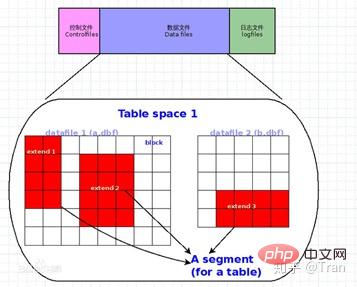What is oracle tablespace
Oracle table space is a logical division of the database and the smallest unit for Oracle database recovery. It accommodates many database entities, such as tables, views, indexes, clusters, rollback segments, temporary segments, etc. An Oracle database can have one or more table spaces, and a table space corresponds to one or more physical database files.

The operating environment of this tutorial: Windows 7 system, Oracle 11g version, Dell G3 computer.
1. Concept
Oracle tablespaces (tablespaces) is a logical concept. Data files are what actually store data. An Oracle database can have one or more table spaces, and a table space corresponds to one or more physical database files.
Table space is the smallest unit for Oracle database recovery, housing many database entities, such as tables, views, indexes, clusters, rollback segments, temporary segments, etc.
1. Features of Oracle table space:
(1) Control database data disk allocation;
(2) Restrict users in the table space The amount of disk space that can be used;
(3) The table space has online, offline, readonly, and readwrite attributes.
2. Classification of table spaces:
Permanent table space: some objects to be permanently stored in the database, such as: tables, views , Stored procedure
Temporary table space: The process executed in the middle of the database operation. After the execution is completed, the stored content will be automatically released
UNDO table space: used to save the old values of transaction modified data, and can roll back the data
Segment (segment) refers to the space occupied by the data file Common name, or a collection of space used by database objects; segments can include table segments, index segments, rollback segments, temporary segments, cache segments, etc.
Extent (Interval/Extension), any continuous block allocated to an object (such as a table) is called an interval; the interval is also called an extension, because when it uses up the allocated interval, it will When new records are inserted, a new interval must be allocated (that is, some blocks are extended); once the interval is allocated to an object (table, index, and cluster), the interval cannot be allocated to other objects.

Structural diagram

datafile, segment, extend relationship diagram
2. Related views
select * from dba_data_files; --describes database files 数据文件信息 select * from dba_temp_files; --describes all temporary files (tempfiles) in the database 临时数据文件信息 select * from dba_free_space; --describes the free extents in all tablespaces in the database 数据库中所有表空间中的空闲扩展区 select * from dba_segments; --describes the storage allocated for all segments in the database 数据库中的所有段分配的存储



3. Related operations
1. Create table space
--语法: create [temporary] tablespace tablespace_name tempfile|datafile ‘xx.dbf’ size xx; --创建临时表空间时,加上temporary关键字;
2. Expand the table space. When a certain table space is used up, the insert operation can no longer be performed on the database table. At this time, we need to expand the table space. , you can expand the table space by adding datafile files.
select f.* from dba_data_files f where f.tablespace_name='MLT';--查看表空间信息
alter tablespace MLT --表空间名
add datafile '/home/oracle/oradata/crm/mlt04.dbf' --datafile文件路径
size 100M --表空间大小
autoextend on --自动扩展
3. Modify the status of the table space
alter tablespace tablespace_name online|offline;--表空间是脱机时不可用,默认是联机的
4. Delete table space
drop tablespace tablespace_name[including contents]; --including contents 表示删除表空间包括datafile数据文件,不加则不删除相关数据文件; --删除数据文件时,不能删除表空间当中第一个数据文件,如果要删除就需要删除整个表空间。
5. Check table space usage
--查询表空间使用情况SELECT Upper(F.TABLESPACE_NAME) "表空间名",
D.TOT_GROOTTE_MB "表空间大小(M)",
D.TOT_GROOTTE_MB - F.TOTAL_BYTES "已使用空间(M)",
To_char(Round(( D.TOT_GROOTTE_MB - F.TOTAL_BYTES ) / D.TOT_GROOTTE_MB * 100, 2), '990.99')
|| '%' "使用比",
F.TOTAL_BYTES "空闲空间(M)",
F.MAX_BYTES "最大块(M)"FROM (SELECT TABLESPACE_NAME,
Round(Sum(BYTES) / ( 1024 * 1024 ), 2) TOTAL_BYTES,
Round(Max(BYTES) / ( 1024 * 1024 ), 2) MAX_BYTES
FROM SYS.DBA_FREE_SPACE
GROUP BY TABLESPACE_NAME) F,
(SELECT DD.TABLESPACE_NAME,
Round(Sum(DD.BYTES) / ( 1024 * 1024 ), 2) TOT_GROOTTE_MB
FROM SYS.DBA_DATA_FILES DD
GROUP BY DD.TABLESPACE_NAME) DWHERE D.TABLESPACE_NAME = F.TABLESPACE_NAME--查询表空间的空闲扩展区select tablespace_name, count(*) AS extends,round(sum(bytes) / 1024 / 1024, 2) AS 大小/MB,sum(blocks) AS blocks from dba_free_space group BY tablespace_name;--查询表空间的总容量select tablespace_name, sum(bytes) / 1024 / 1024 as MB from dba_data_files group by tablespace_name;--查询表空间使用率SELECT total.tablespace_name,
Round(total.MB, 2) AS 总量/MB,
Round(total.MB - free.MB, 2) AS 已使用/MB,
Round(( 1 - free.MB / total.MB ) * 100, 2) || '%' AS 使用率FROM (SELECT tablespace_name,
Sum(bytes) / 1024 / 1024 AS MB
FROM dba_free_space
GROUP BY tablespace_name) free,
(SELECT tablespace_name,
Sum(bytes) / 1024 / 1024 AS MB
FROM dba_data_files
GROUP BY tablespace_name) totalWHERE free.tablespace_name = total.tablespace_name;Recommended tutorial: "Oracle Tutorial》
The above is the detailed content of What is oracle tablespace. For more information, please follow other related articles on the PHP Chinese website!

Hot AI Tools

Undresser.AI Undress
AI-powered app for creating realistic nude photos

AI Clothes Remover
Online AI tool for removing clothes from photos.

Undress AI Tool
Undress images for free

Clothoff.io
AI clothes remover

AI Hentai Generator
Generate AI Hentai for free.

Hot Article

Hot Tools

Notepad++7.3.1
Easy-to-use and free code editor

SublimeText3 Chinese version
Chinese version, very easy to use

Zend Studio 13.0.1
Powerful PHP integrated development environment

Dreamweaver CS6
Visual web development tools

SublimeText3 Mac version
God-level code editing software (SublimeText3)

Hot Topics
 How long will Oracle database logs be kept?
May 10, 2024 am 03:27 AM
How long will Oracle database logs be kept?
May 10, 2024 am 03:27 AM
The retention period of Oracle database logs depends on the log type and configuration, including: Redo logs: determined by the maximum size configured with the "LOG_ARCHIVE_DEST" parameter. Archived redo logs: Determined by the maximum size configured by the "DB_RECOVERY_FILE_DEST_SIZE" parameter. Online redo logs: not archived, lost when the database is restarted, and the retention period is consistent with the instance running time. Audit log: Configured by the "AUDIT_TRAIL" parameter, retained for 30 days by default.
 Function to calculate the number of days between two dates in oracle
May 08, 2024 pm 07:45 PM
Function to calculate the number of days between two dates in oracle
May 08, 2024 pm 07:45 PM
The function in Oracle to calculate the number of days between two dates is DATEDIFF(). The specific usage is as follows: Specify the time interval unit: interval (such as day, month, year) Specify two date values: date1 and date2DATEDIFF(interval, date1, date2) Return the difference in days
 The order of the oracle database startup steps is
May 10, 2024 am 01:48 AM
The order of the oracle database startup steps is
May 10, 2024 am 01:48 AM
The Oracle database startup sequence is: 1. Check the preconditions; 2. Start the listener; 3. Start the database instance; 4. Wait for the database to open; 5. Connect to the database; 6. Verify the database status; 7. Enable the service (if necessary ); 8. Test the connection.
 How much memory does oracle require?
May 10, 2024 am 04:12 AM
How much memory does oracle require?
May 10, 2024 am 04:12 AM
The amount of memory required by Oracle depends on database size, activity level, and required performance level: for storing data buffers, index buffers, executing SQL statements, and managing the data dictionary cache. The exact amount is affected by database size, activity level, and required performance level. Best practices include setting the appropriate SGA size, sizing SGA components, using AMM, and monitoring memory usage.
 How to use interval in oracle
May 08, 2024 pm 07:54 PM
How to use interval in oracle
May 08, 2024 pm 07:54 PM
The INTERVAL data type in Oracle is used to represent time intervals. The syntax is INTERVAL <precision> <unit>. You can use addition, subtraction, multiplication and division operations to operate INTERVAL, which is suitable for scenarios such as storing time data and calculating date differences.
 How to see the number of occurrences of a certain character in Oracle
May 09, 2024 pm 09:33 PM
How to see the number of occurrences of a certain character in Oracle
May 09, 2024 pm 09:33 PM
To find the number of occurrences of a character in Oracle, perform the following steps: Get the total length of a string; Get the length of the substring in which a character occurs; Count the number of occurrences of a character by subtracting the substring length from the total length.
 How to replace string in oracle
May 08, 2024 pm 07:24 PM
How to replace string in oracle
May 08, 2024 pm 07:24 PM
The method of replacing strings in Oracle is to use the REPLACE function. The syntax of this function is: REPLACE(string, search_string, replace_string). Usage steps: 1. Identify the substring to be replaced; 2. Determine the new string to replace the substring; 3. Use the REPLACE function to replace. Advanced usage includes: multiple replacements, case sensitivity, special character replacement, etc.
 Oracle database server hardware configuration requirements
May 10, 2024 am 04:00 AM
Oracle database server hardware configuration requirements
May 10, 2024 am 04:00 AM
Oracle database server hardware configuration requirements: Processor: multi-core, with a main frequency of at least 2.5 GHz. For large databases, 32 cores or more are recommended. Memory: At least 8GB for small databases, 16-64GB for medium sizes, up to 512GB or more for large databases or heavy workloads. Storage: SSD or NVMe disks, RAID arrays for redundancy and performance. Network: High-speed network (10GbE or higher), dedicated network card, low-latency network. Others: Stable power supply, redundant components, compatible operating system and software, heat dissipation and cooling system.






